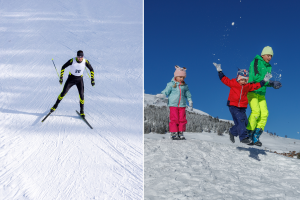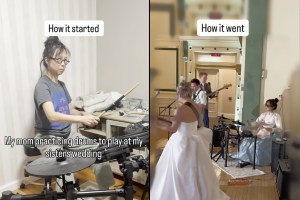When Josh Kaplan was a kid, he had a pretty hard time fitting in.
“I had a terrible stutter,” he says. “I really struggled to make friends.”
Finally, Kaplan opened up to his parents about the difficulty he was having with classmates at school.
“They said, ‘Why don’t we sign you up for a soccer team?’” Kaplan says. And that decision changed everything.
“I discovered that you don’t have to be a leader who speaks,” he says. “You can lead with action instead.”
Kaplan’s realization changed his perception of what he had to offer. As he got better at soccer, he got better at making friends too.
But still something bothered him.
“One of my teammates had a brother with Down’s syndrome, and I noticed that he was kicking the ball around by himself on the sidelines,” Kaplan says. “I discovered that he played soccer alone because he didn’t have a team to play on.”
Soccer had helped Josh fit in — now he realized he could help others do the same thing.
“I had all the tools and skills necessary to share soccer with kids who weren’t able to experience the joy of the beautiful game,” he says.
He launched GOALS, which stands for Giving Opportunities to All who Love Soccer.
GOALS pairs up neurotypical kids and kids with disabilities to play in noncompetitive soccer scrimmages. Buddies, or kids without disabilities, work to make sure that all the athletes have an opportunity to play. In doing so, GOALS gives socially isolated kids an opportunity to make friends, learn about soccer, and be part of a team.
But it wasn’t always easy. In fact, Kaplan’s first organized game was almost a failure.
Kaplan spent weeks emailing and cold-calling pediatricians, special needs groups, and parent advocacy groups to find kids interested in participating in the game. He received an overwhelmingly positive response, and over 40 kids signed up to play.
“But when it was time to play, only nine kids showed up,” Kaplan remembers. “I was so disappointed and even a little embarrassed.”
He was faced with a choice: give up or play the game. “I realized that those nine kids wanted to play soccer, and I couldn’t let them down,” he says. Now GOALS has grown to involve hundreds of children — but it all started with that first small scrimmage.
The games afford kids an amazing opportunity to understand and interact with kids who might be different from them.
Kids both with and without disabilities walk away from GOALS having gained new experiences and skills.
“The players who don’t have an intellectual disability, getting them to encounter someone who does have an intellectual disability teaches them really important skills,” Josh says, like patience, compassion, dedication, cooperation, and teamwork.
The athletes with disabilities learn something a bit more pragmatic — like becoming comfortable with interactions with other kids their age.
“Oftentimes a lot of kids with intellectual disabilities are isolated socially,” Kaplan says. “Developing those key social skills and communication skills is really important.”
Most importantly, though, is the fact that everyone gets a chance to play, interact, and be part of a team.
“Feeling valued and accepted is one of the most important aspects of GOALS,” says Kaplan. Playing together, kids don’t just make teammates — they make friends for life, friends they may not have had the opportunity to make otherwise.
Kaplan’s philosophy is that sports helps people communicate in a new way, one that works for people of all abilities. That’s why GOALS isn’t just an organization for kids with disabilities. It’s a program for the whole community, a community that includes people of all different abilities.
Soccer may just be a game, but with GOALS, it becomes so much more than that.
“Through sports,” Kaplan says, “anyone can communicate that each of us is valued, each of us is a part of the team, and each of us is a friend worth having.”


































